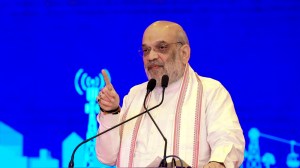Stay updated with the latest - Click here to follow us on Instagram
Hopeful of GST Bill in ensuing Budget session: Jaitley
‘Optimistic since halfway through next session numbers in Rajya Sabha will turn favourable’
 Finance Minister Arun Jaitley addressing the officer trainees of the Indian Revenue Service (Customs & C Excise) of the 67th batch in New Delhi on Saturday. (Source: PTI)
Finance Minister Arun Jaitley addressing the officer trainees of the Indian Revenue Service (Customs & C Excise) of the 67th batch in New Delhi on Saturday. (Source: PTI)
The Goods and Services Tax (GST) is already delayed and should have come much earlier, finance minister Arun Jaitley said on Saturday, adding that he is optimistic about passage of Constitution Bill for GST in the next session of Parliament as numbers in the Rajya Sabha will turn favourable.
“The next session is going to be extremely important. And halfway through the next session, the numbers of the Upper House are also going to change. So I am reasonably optimistic, as far as the next session is concerned, that we may be able to push it (GST Bill) through,” Jaitley said while addressing the officer trainees of the Indian Revenue Service.
Parliament’s Budget session will start in last week of February. The finance minister said there is consensus for GST among political parties.
“Between political parties, it’s no secret that there is virtually a consensus , everybody supports it and then parliamentary obstructionism has prevented it from happening in the last two sessions. The next session is going to be extremely important,” the finance minister said.
The Winter Session of Parliament was a washout, with the government being unable to resolve the impasse over GST. Lok Sabha and Rajya Sabha passed 13 and 9 bills, respectively during the Winter Session of Parliament.
The GST regime, touted as the most important indirect tax reform since Independence, aims to integrate central excise, service tax and state value-added tax. The Constitution amendment bill hit a roadblock in the Rajya Sabha, where the government does not have a majority. The Lok Sabha had passed the Constitution amendment on GST in May.
After passage from the Rajya Sabha, it needs to be ratified by 50 per cent of states. The proposed tax regime aims to integrate central excise, service tax and state value added tax. After passing the Constitution amendment, three other legislations — the central law, the state law and integrated GST— have to be passed before the new tax regime can be rolled out.
Jaitley said the concept of GST was first conceived in 2006 and the Constitution Amendment Bill was first introduced in 2011, but the UPA government could not build a consensus with states.
He added the present government after coming to power built broad consensus among the states and following that brought the Constitution Amendment Bill to Parliament again.
On the issue of retrospective taxation, Jaitley said it has hurt the country as it scared away the investors. “If you ask me 4-5 years later, in Income Tax Act… did the provisions of the retrospective taxation help India or did they hurt India? My answer is very clear, they hurt India because at the end of the day we have not been able to collect those taxes and we scared investors away,” he said.
Referring to the retrospective tax law brought in by the previous United Progressive Alliance (UPA) government, Jaitley said investors want stability and predictability and they don’t want to be hit
by a surprise that upsets business planning and “therefore it is important that standards of fairness in taxation must be maintained.”
The UPA regime had amended Income-Tax Act in 2012, and used the changes norms with retrospective effect to raise tax demands from UK’s Vodafone and later in 2014 from Edinburgh-based Cairn Energy Plc.








